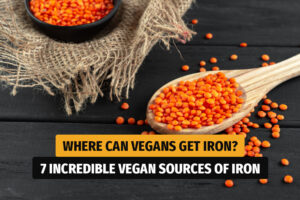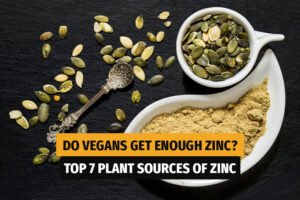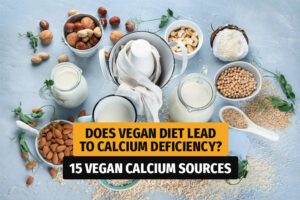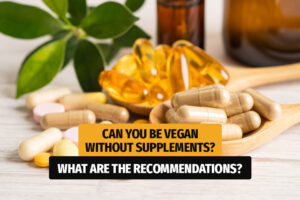
Switching to a plant-based diet is associated with a higher intake of complex carbohydrates, fiber, magnesium, folic acid, vitamins C and E, carotenoids and other beneficial phytonutrients.
Vitamin B12 is found in abundance in animal products such as meat, fish, eggs and dairy products. There are almost no other natural sources except algae, but we will get to those later. You probably get the picture and are starting to see why vegans need to take B12.
What is Vitamin B12?
Vitamin B12, also known as cobalamin, is a water-soluble vitamin that is essential for several critical bodily functions. It’s unique among vitamins because it contains a metal ion, cobalt, which is why compounds with vitamin B12 activity are collectively called “cobalamins.”
The primary roles of Vitamin B12 in the body include:
- Red Blood Cell Formation: B12 is vital for the production of red blood cells. A deficiency can lead to red blood cells that are too large and unable to move from the bone marrow into the bloodstream effectively, leading to a type of anemia.
- Nervous System Function: It’s crucial for maintaining the health of nerve cells. B12 helps in the production of myelin, the protective sheath that covers nerves and facilitates the rapid transmission of nerve impulses.
- DNA Synthesis: Vitamin B12 is involved in DNA production, the genetic material present in all cells. This process is crucial for normal cell division and growth.
- Energy Metabolism: Although B12 itself doesn’t provide energy, it plays a significant role in energy metabolism by helping to convert carbohydrates, fats, and proteins from food into energy.
Vitamin B12 is naturally found in animal products, including meat, fish, poultry, eggs, and dairy products. This is why vegans and some vegetarians are at a higher risk for B12 deficiency and may need to take supplements or consume B12-fortified foods.
The body can store several years’ worth of Vitamin B12 in the liver, so a deficiency can take a long time to develop. However, once it occurs, it can lead to significant health problems, hence the importance of ensuring adequate intake through diet or supplementation, especially for those following plant-based diets.
Why Do Vegans Need to Take B12 Supplements?
Vegans need to take Vitamin B12 supplements because B12, an essential nutrient, is primarily found in animal products and is not adequately available in plant-based foods. Vitamin B12 is vital for many bodily functions, including nerve function, blood cell formation, and DNA synthesis.
In a typical diet, B12 is mainly sourced from meat, poultry, fish, eggs, and dairy products. Since vegans exclude all animal-derived foods, they miss out on the primary natural sources of this vitamin. While some plant-based foods, such as certain fortified cereals and plant milks, may contain B12, they often do not provide enough to meet daily requirements.
The body cannot produce Vitamin B12, so it must be obtained from the diet or supplements. A deficiency in B12 can lead to serious health issues, such as anemia, nervous system damage, fatigue, weakness, and cognitive disturbances.
Supplementation ensures that vegans receive an adequate amount of B12 for their health. It’s a simple and effective way to prevent deficiency and maintain overall well-being. Regular monitoring of B12 levels is also advisable for those following a strictly plant-based diet. This precaution ensures that their intake is sufficient and that they are absorbing the vitamin effectively.
What is Vitamin B12 Responsible For?
Vitamin B12, a crucial water-soluble vitamin, plays several vital roles in the human body:
- Red Blood Cell Formation: B12 is essential for the production of red blood cells. It aids in the formation of healthy red blood cells that carry oxygen throughout the body. A deficiency can lead to anemia, characterized by a reduced quantity or abnormal form of red blood cells.
- Nervous System Health: Vitamin B12 is critical for maintaining the health of the nervous system. It’s involved in the production of myelin, a substance that forms a protective sheath around nerves, facilitating effective nerve impulse transmission. Without sufficient B12, nerve function can be compromised.
- DNA Synthesis: It plays a key role in DNA synthesis and repair. DNA is the genetic material in all cells, and proper DNA function is essential for all basic cellular processes.
- Metabolism: Vitamin B12 is involved in the metabolism of every cell in the body. It affects fat and protein metabolism and assists in the conversion of carbohydrates into glucose, which the body uses for energy.
- Mental Health: Adequate levels of B12 are linked to mental health. Deficiencies can lead to various neurological and psychiatric conditions, including memory loss, confusion, depression, and dementia.
- Heart Health: B12, in conjunction with other B vitamins, helps control homocysteine levels in the blood. Elevated homocysteine levels are associated with an increased risk of heart diseases.
Given its wide-ranging roles, maintaining adequate levels of Vitamin B12 is crucial for overall health. This is particularly important for individuals at risk of deficiency, such as older adults, those with certain medical conditions, and people on strict vegetarian or vegan diets.
How Common is B12 Deficiency in Vegans?
Vitamin B12 deficiency is relatively common among vegans, largely due to the absence of natural animal-based sources of this vitamin in their diet. Vegans, who exclude all forms of animal products including meat, fish, dairy, and eggs, often miss out on the primary sources of B12. The risk of deficiency hinges on various factors, including their specific dietary habits and whether they consume B12-fortified foods or supplements.
Since B12 is not readily available in plant foods, those in the vegan community who do not supplement their diet or consume fortified foods are particularly at risk. Additionally, factors such as age can influence B12 absorption, putting older vegans at a higher risk. Each individual’s ability to absorb B12 efficiently also varies, which can further affect their susceptibility to deficiency.
Without proactive measures to include B12 through fortified foods or supplements, vegans may experience a deficiency, highlighting the importance of awareness and nutritional planning within vegan diets to maintain adequate B12 levels.
To dig deeper I suggest you read this article about Vitamin B12 at Vegan Society.
The Symptoms of B12 Deficiency
Vitamin B12 deficiency can manifest in various ways, with symptoms ranging from mild to severe. It’s important to recognize these signs as prolonged B12 deficiency can lead to serious health problems. The symptoms include:
- Fatigue and Weakness: One of the most common early signs is a feeling of tiredness and general lack of energy.
- Anemia: Since B12 is crucial for red blood cell production, a deficiency can lead to anemia, characterized by symptoms like paleness, shortness of breath, and dizziness.
- Nerve Problems: Tingling and numbness in the hands and feet, balance problems, and nerve damage can occur due to the role of B12 in nerve health.
- Mood Changes: B12 deficiency is associated with mood disturbances, including depression and irritability.
- Cognitive Issues: Difficulty in concentrating, memory loss, and cognitive decline can be symptoms of B12 deficiency.
- Gastrointestinal Symptoms: These can include nausea, diarrhea, or constipation and loss of appetite.
- Heart Palpitations: Some people experience an increased heart rate or palpitations.
- Mouth and Tongue Changes: Soreness of the tongue, mouth ulcers, and a red, swollen tongue (known as glossitis) can also be signs.
- Vision Problems: In rare cases, untreated B12 deficiency can affect the optic nerve, leading to vision changes.
It’s crucial to consult a healthcare professional if you’re experiencing any of these symptoms, especially if you’re at a higher risk of deficiency, such as being vegan, elderly, or having certain gastrointestinal conditions that affect nutrient absorption. Blood tests can confirm a B12 deficiency, and treatment often involves dietary changes, oral supplements, or injections, depending on the severity.
Who is at Risk For B12 Deficiency?
Vitamin B12 deficiency poses a risk for people who have insufficient dietary intake of the vitamin, absorption problems, or taking medicines that interfere with absorption.
Risk of vitamin B12 deficiency is increased in certain groups of people which include:
- Vegetarians and vegans
- People over 50 years of age
- People with gastrointestinal disorders, including Crohn’s disease and celiac disease
- People who have had gastrointestinal surgery, fat removal surgery or bowel resection
- People taking metformin and acid-reducing drugs
- People who suffer from a type of anemia called pernicious anemia
- People with specific genetic mutations such as MTHFR, MTRR and CBS
- People who regularly consume alcoholic beverages
Find out more about Vitamin B12 deficiency at NHS website.
Is There a Vegan Source of B12?
Often cited sources of vitamin B12 that should also provide vegans with sufficient amounts are algae, cyanobacteria, fermented foods, (organic) vegetables with incomplete soil removal and human gut microflora.
Unfortunately, none of those have proven to be a reliable source of B12. Science says there seems to be no proper vegan B12 sources as there are no satisfactory studies that consistently confirm the efficacy of this type of B12 supplementation.

You might find this interesting:
Can You Be Vegan Without Supplements?
Is There B12 in Algae?
»But you mentioned algae in the beginning! « Yes, I did, but here is the thing. Algae and cyanobacteria produce B12 for their own metabolic needs, in which case the more appropriate term for B12 is cobalamin.
Humans can only use certain types of cobalamins, and those types of cobalamins that cannot be used are called B12 analogues. In the case of algae and cyanobacteria, it is mainly the production of B12 analogues that cannot be used by the human body.
Some algae produce B12 through symbiosis with bacteria, and bacteria in symbiosis with algae can also produce B12 analogues. When algae produce B12 that is useful for humans, its availability depends largely on how the algae are prepared.
A well-known example of B12 in algae is nori algae, for which some studies have confirmed the presence of ‘true’ B12, but the amount of B12 has been shown to depend on whether the algae are raw and freshly harvested or dried. Dried nori seaweed did not contain active B12.
Do Fermented Foods Have B12?
Studies suggest that fermented foods also contain some B12. Probably due to contamination during preparation, or in other cases it is thought to be produced by bacteria involved in the fermentation process. There are no large-scale studies confirming fermented foods as a sufficient source of B12.
The same is true for unwashed, organic vegetables.
What about human gut microflora? The human microflora does produce B12, but in the large intestine, where it cannot be absorbed.
Therefore, relying on vegan dietary sources of vitamin B12 is not reasonable or scientifically justified. It is for this reason that it is advisable for vegans to ensure that their B12 intake is in the form of a supplement. In this way, we get it directly from the source – the bacteria, which are the only source of B12, even when it comes to supplements.
How Many Types of Vitamin B12 Are There?
When we speak of B12 supplements, there are four types (forms) of vitamin B12:
- Methylcobalamin
- Adenosyl cobalamin
- Hydroxycobalamin
- Cyanocobalamin
All four forms are derived from bacterial production, just like the B12 found in animal foods. The difference is that B12 in supplement form is not bound to proteins in food.
Whichever form of B12 is consumed, it is always converted in the body to either methylcobalamin or adenosylcobalamin, the metabolically active forms of B12.
Which Form of B12 is Better? What Form of B12 is Best Absorbed?
Chemically, cyanocobalamin represents the most stable form of cobalamin, and is therefore the easiest to produce and the least expensive of all the forms of B12 substitutes.
There are no real differences in the absorption of the different types of B12, so it does not matter which supplement is chosen.
The toxic cyanide content, which can be disturbing with cyanocobalamin, is negligible. Cyanocobalamin should be avoided only by people with renal failure, cyanide metabolism disorders and smokers.
B12 can be supplemented in dissolved form or in the form of tablets that are dissolved under the tongue or swallowed. Both routes are equally successful in replacing B12.
Replacement by injection is also possible but is as successful as replacement by tablets.
How Much B12 a Day Do You Need?
The official recommendation is currently that an adult needs 2.4 µg of vitamin B12 daily, but several studies recommend higher amounts (estimates vary from 4-10 µg).
The gold standard for measuring adequate B12 levels is the blood concentration of methylmalonylic acid, and this is because B12 is essential for the enzymatic conversion of methylmalonylic acid to succinyl-CoA. Thus, at elevated levels of methylmalonylic acid, we can be sure that the body is deficient in B12.
Given that the 4-10 µg figure in the studies mentioned above was arrived at precisely through the measurement of methylmalonylic acid and given that the 2.4 µg figure is based on a 1958 study, it would be prudent to take higher amounts of B12 than officially recommended.
How is B12 Absorbed in the Body?
Vitamin B12 is absorbed in the intestine. 1.5-2.0 µg is absorbed actively (bound to intrinsic factor) and between 1-3% of the ingested amount is absorbed passively (via passive diffusion).
In the case of a 1000 µg vitamin B12 tablet, at least 11.5 µg is therefore absorbed, which is more than even the maximum daily recommendations. Let us remember that B12 is stored in the liver, and it is not necessary to take a supplement every day, but an average can be taken.
In the case of a 1000 µg vitamin B12 tablet taken every other day, this gives an average of 5.75 µg B12 per day, which also meets the recommendations. In principle, vitamin B12 is very safe to consume, even at levels higher than the recommendations.
Conclusion
Finally, let us reiterate that the vitamin B12 in supplements is produced by bacteria, which are the only source of all B12, including that found in animal foods.
As already mentioned, the problem with vitamin B12 in animal foods is that it is bound to proteins, and with age human body loses the ability to separate B12 from the proteins to which it is bound.
As life expectancy increases and the proportion of elderly people increases, B12 replacement is becoming part of the general recommendations for healthy living.
An even more obvious problem with B12 found in foods of animal origin is the association of such diets with many degenerative and chronic diseases. On the other hand, eating a whole-food plant-based diet has many health benefits. Given the availability of substitutes and the ease with which they can be consumed, vitamin B12 really is not and should not be a reason for the failure of this type of diet.






